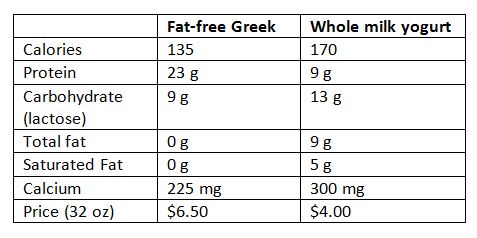 Larry writes with an interesting dilemma:
Larry writes with an interesting dilemma:
“I eat yogurt pretty regularly as a mid-day lunch/snack. I usually add nuts, hemp seeds, a bit of granola and cinnamon. My ideal choice would be full fat plain Greek yogurt but my local store only has fat-free Greek. If I have to choose between fat free Greek and full fat regular yogurt, which would you recommend?”
Here’s the salient nutrition info on both options (for an 8 ounce serving) followed by some considerations for each point.
Calories: We shouldn’t always assume that fewer calories better! If you eat small frequent meals, for example, or you’re trying to lose weight, you might be looking for lower calorie options. But if you eat fewer, more widely spaced meals, or you’re extremely active, a higher-calorie meal may be preferable. Either way, however, a difference of 35 calories is pretty trivial in the context of your total daily intake (much less in the context of a yogurt, nut, hemp seed, and granola snack). So I think I’d have to call a draw for this criterion.Protein: Greek yogurt kills it on protein, with 2.5 times as much per serving. For most people, I’d call that a clear advantage. If for any reason you need to limit protein (kidney disease, perhaps?), that might not be ideal.
Carbs/milk sugars: Greek yogurt is lower in carbohydrates which, in yogurt , are almost entirely in the form of milk sugar or lactose. If you’re lactose intolerant, even 9 grams might be more than you can comfortably process. But in terms of your overall carbohydrate and/or sugar intake, a difference of 4 grams is pretty small–and these really aren’t the carbs or carbohydrates we’re worried about anyway. But if you’re carb averse, we could call that a slight advantage for Greek yogurt.
Fat/Saturated Fat: Here’s where it gets a little more interesting. It used to be that being lower in fat (or fat free!) would be considered an uncontested advantage, but not anymore. As long as it’s not pushing your total calorie intake too high, fat can make meals more satisfying AND satiating. (There is a difference).
Even the fact that half of the fat in yogurt is saturated isn’t necessarily a problem–unless perhaps you have high cholesterol, or you also like to eat lots of other foods that are high in saturated fats like butter and cheese. In that case, you need decide how you want to budget your saturated fat allowance. Because I do love cheese, I might go for the fat-free Greek and save it for Brie. But that’s me.
Calcium: Regular yogurt has a slight advantage here because some of the calcium gets strained off with the whey to make Greek yogurt. As long as you have plenty of other sources of calcium in your diet, this is probably not a big deal.
Price: Finally, there is a rather dramatic up-charge for Greek yogurt, because it takes a lot more milk to produce the same volume of yogurt. Whether that tips the scale for you is really a matter of personal finances.
But what about…
I haven’t really answered Larry’s question because I don’t have all the necessary particulars. And even if I did, what’s right for Larry might not be right for you (or me).
This question also has endless variations: How would whole milk yogurt compare to 2% Greek? Is fat free Greek better than low fat regular? Does this little exercise give you a better idea how you might go about comparing two choices and finding what’s right for you?


The yogurt I prefer is my own homemade yogurt. With whole milk, real fruit and low sugar
Great post!
Regarding the type of carbs that we should be worried about.. would that be simple/refined carbs?
If so, isn’t milk carbs (lactose) a simple sugar (mono/disacchrides).. even if it were complex (oligo/polysaccharides), it would still break down very easily to sugar (like a starch) rather than fiber (low glycemic load).
I don’t usually read nutrition labels too much, nor avoid carbs/sat fats, but curious aboout your distinction.
Ben, you’re right that lactose is a simple sugar and affects the body like any other simple sugar. The distinction between this and the sugar you might get from, say, soda is that milk provides other nutrients such as protein and calcium whereas the soda provides nothing but empty sugar calories. More here: http://www.quickanddirtytips.com/health-fitness/healthy-eating/ask-diva-does-sugar-fruit-%E2%80%9Ccount%E2%80%9D-sugar
I would think that the healthiest yogurt of all, is the whole-milk, unsweetened kind. In such yogurt, there is no added sugar at all. Plus, the absorption of the natural carbs that are in there, is slowed down by its protein and fat content.
I love stoneyfield Greek yogurt. I have high cholesterol and need to watch my sugar intake due to prediabetes. I don’t know which yogurt to buy— 0% plain Greek yogurt or Greek whole milk yogurt. With the 0% yogurt that I now eat, I add about 3 tsp. Of strawberry whole milk yogurt for taste. I really don’t know what to do.